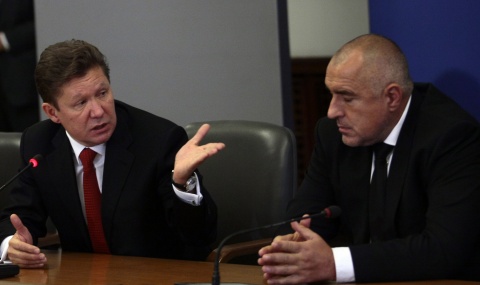
EU and US Policy on South Stream Remains Ambiguous
Publication: Eurasia Daily Monitor Volume: 9 Issue: 211
By:

On November 15, Bulgaria signed the final investment decision on the South Stream natural gas project, becoming the last country among Gazprom partners to give the project a green light. Serbia, Hungary and Slovenia have already approved their final investment agreements with Gazprom. On November 14, the Board of Directors of South Stream Transport adopted in Milan the final investment decision for the offshore gas pipeline section. With all agreements in place, the construction of the gas pipeline from Russia via the Black Sea to Europe is set to start by the end of the year. Russian President Vladimir Putin has invited the prime ministers and energy ministers of the South Stream partnering states to the groundbreaking ceremony on December 7 at the Russian town of Anapa, on the Black Sea coast, where the line will begin (Standart, November 12; Interfax, November 13; Gazprom.com, November 14; BTA, November 15).
The South Stream investment agreement was signed in Sofia by Gazprom’s CEO Alexey Miller and the Executive Director of Bulgarian Energy Holding Mihail Andonov in the presence of Prime Minister Boyko Borisov and Energy Minister Delyan Dobrev. Bulgaria received a significant gas discount, which as Miller pointed out was given because of the future strategic partnership between Bulgaria and Russia in the gas sphere (Dnevnik, November 15).
Gazprom’s Eastern European partners were attracted to South Stream mainly for the opportunity to buy cheaper gas from Russia, collect transit fees and receive direct uninterrupted gas supplies. South Stream’s strategic importance for the Kremlin provided them with leverage in bargaining with Gazprom. Sofia managed to negotiate gas prices that are lower by 20 percent compared to those paid in 2011 and the beginning of 2012. In the next ten years, Bulgaria’s price for Russian gas will be a little higher than Germany’s (current price of Russian gas in Germany is $450 per one thousand cubic meters). A significant part of the discount will come from the elimination of two of the three intermediaries used by Gazprom for years: Overgas Inc. and Wintershall. Gazprom’s subsidiary Gazpromexport will remain the only intermediary active in the Bulgarian gas market. Sofia also managed to negotiate a more flexible, ten-year contract with an option to reduce gas purchases after the sixth year if alternative gas sources become available (BTA, 24 Hours, Standart, Dnevnik, Capital, November 15).
The Bulgarian sector of the South Stream natural gas pipeline will be fully constructed entirely with loaned funds, with no risks taken by the Bulgarian state. The Bulgarian state will not use its own funds in the project and will not take the risk for its realization. The risks will be taken by the project company South Stream Bulgaria whose shareholders, with 50 percent each, are Gazprom and Bulgarian Energy Holding, according to Energy Minister Delyan Dobrev (Nova TV, November 13).
Meanwhile, Gazprom announced that Greece would not be a part of South Stream, thus effectively abandoning the second leg of the pipeline from Bulgaria via Greece to southern Italy (hurriyetdailynews.com, November 14). Senior Gazprom officials explained that the insufficient demand for gas on the Greek market could not cover the cost of the investment. “We are not going to construct a pipeline to be empty,” said Leonid Chugunov, head of the company’s Project Management Department (Kathimerini Online, November 14). According to Gazprom, should Greece need more gas, it could arrive via the interconnectors with Bulgaria and Turkey. But Gazprom is not giving up on its bid to buy Greece’s state-owned gas operator DEPA, although the EU’s third energy package, set to become effective in March 2013, would ban the Russian gas monopoly from controlling European pipelines (RT, November 7).
The acceleration of the South Stream gas pipeline is raising a number of concerns in Brussels. The EU’s Competition Directorate has started an anti-monopoly probe into Gazprom’s practices in Eastern Europe. At the same time, the EU is pressing its member states partnering with Gazprom to make sure all South Stream contracts comply with existing EU regulations. However, Gazprom seems to make decisions on the final route of South Stream piece by piece, using bilateral negotiations while keeping the EU in the dark. The EU Energy Commissioner Guenther Oettinger has not yet received any official plans for the South Stream route (naturalgaseurope.com, November 15). Energy Commissioner spokesperson Marlene Holzner stressed that the EU requires time-consuming environmental impact assessment studies before construction of any large-scale infrastructure project begins (New Europe, November 4). Such studies have not been initiated for the Black Sea portion of the gas pipeline, or for the on-shore portions in Bulgaria, Serbia, Hungary, Slovenia and Austria. Bulgaria expects the environmental impact study to be ready by July 2013, but the process in all transit countries may take from one to two years, according to the EU.
Although the EU has reiterated numerous times that the Nabucco gas pipeline from Azerbaijan via Turkey to Europe is its priority project, Brussels’s policy on South Stream has remained ambiguous. The EU mostly uses its legal procedures, such as energy regulations, to restrict Gazprom’s penetration in Eastern and Western European countries, but it has not formulated a clear policy line and most importantly has not mobilized resources to support Nabucco. The United States seems to have undergone a complete change of policy—from unwavering support for the Nabucco pipeline under the Bill Clinton and George W. Bush administrations, to a more ambivalent position under the Obama administration. Speaking at the Atlantic Council in Washington on November 13, Assistant Secretary of State for Europe and Eurasia Philip Gordon said, “We are not picking and choosing pipelines in Europe,” although he stressed that the US supports “energy diversification in Europe.” This statement is demonstrative of the current US policy that no longer considers Europe’s energy independence as a national security interest and is trying not to upset its cordial relations with Russia through a confrontation on strategic energy questions.




